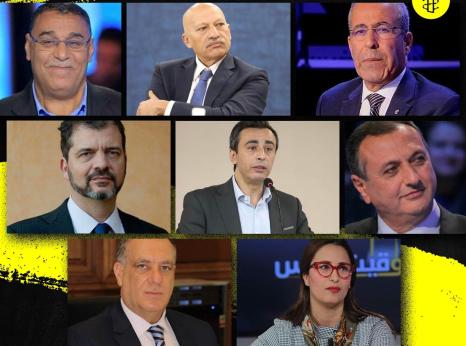Tunisia: Jailed Opposition Figures On Hunger Strike

Since February 2023, Tunisian authorities have opened criminal investigations against at least 40 people on unfounded conspiracy accusations. Amnesty International has document the cases of eight of who are currently detained in relation to this investigation, including politician Khayam Turki who was arrested on 11 February 2023; dissident and politician Abdelhamid Jelassi arrested on 12 February 2023; opposition activist Issam Chebbi arrested on 22 February 2023; opposition activist Jaouhar Ben Mbarek arrested on 24 February 2023; and finally lawyers Ghazi Chaouachi and Ridha Belhaj arrested on 25 February 2023. Prominent opposition figure Chaima Issa, arrested on 22 February 2023, and dissident Lazhar Akremi, arrested on 13 February 2023, were both provisionally released on 13 July 2023 after nearly five months of arbitrary detention.
All eight of them are being investigated in relation to trumped up charges of conspiracy under 10 provisions of the Tunisian Penal Code including Article 72, which mandates the death penalty for trying to “change the nature of the state.” They also face several charges under 17 articles of the 2015 counterterrorism law including Article 32, which mandates up to 20 years of imprisonment for "forming a terrorist organization". Amnesty International has deemed the charges and related investigation to be unfounded. The defendants were questioned about their relationship with one another and with foreign diplomats, on meetings they participated in together as well as on the content of objects seized by police officers during their arrests, including personal notes and WhatsApp messages. No evidence was presented to the defendants proving that they committed any recognizable offenses under international law.
The judge and the Tunis Court of Appeals initially rebuffed requests by lawyers to release the eight suspects from pre-trial detention. However in July, the court released Chaima Issa and Lazhar Akremi and banned from travelling abroad and "appearing in public spaces." The Court extended pretrial detention for the remaining six, citing the need to "ensure the sound course of the investigation". On 21 September 2023, the Tunis Court of Appeals rejected the request to release the remaining six detained defendants in the conspiracy case including Jaouhar Ben Mbarek, Khayyam Turki, Issam Chebbi, Ghazi Chaouachi, Ridha Belhaj and Abdelhamid Jelassi.
In September 2023, authorities opened separate judicial proceedings against lawyers Dalila Msaddek Ben Mbarek and Islam Hamza, both members of the defence committee for public comments they had made about the case on radio shows. They are under investigation for spreading false news” under repressive cybercrimes Decree-Law 54.
On 14 February 2023, UN High Commissioner for Human Rights, Volker Turk expressed concern over the recent wave of arrests against civil society figures and perceived opponents as well as the Tunisian authorities’ sustained attacks on the judiciary. A spokesperson for the commissioner specifically mentioned the criminal proceedings initiated against “perceived political opponents” charged with “conspiracy against State security". The commissioner called on the Tunisian authorities to "respect due process and fair trial standards in all judicial proceedings and to release immediately all those arbitrarily detained, including anyone detained in relation to the exercise of their rights to freedom of opinion or expression”. On 22 February 2023, President Saied declared that anyone who “dared to exonerate” what he described as “criminal networks” was, in essence, an “accomplice.” This statement, coupled with the president’s arbitrary dismissal of 57 judges in 2022, has contributed to a growing climate of intimidation of the judiciary.
On 25 July 2021, President Saied claimed emergency powers that he said were granted to him by Tunisia's 2014 constitution. Since his power grab, President Saied has dissolved Tunisia's former parliament, issued decree-laws that threaten freedom of expression, overseen the drafting of a new constitution, and sought to strengthen his influence over the judiciary. On 1 June 2022, President Saied arbitrarily fired 57 judges whom he accused of conduct including failure to investigate terrorism-related cases, adultery, and holding alcohol-fuelled parties. The Justice Ministry has refused a ruling by Tunisia's Administrative Tribunal to reinstate 49 of them.
Since 25 July 2021, Tunisian authorities have opened criminal investigations against at least 74 opposition figures and other perceived enemies of the president, including at least 44 people accused of crimes in connection with their exercise of their human rights.